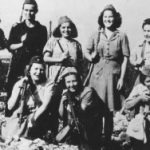 Claudia Jetter and Benjamin Pietrenka (Faculty of theology at Ruprecht-Karls-Univ. Heidelberg and the Heidelberg Center for American Studies) (Web)
Claudia Jetter and Benjamin Pietrenka (Faculty of theology at Ruprecht-Karls-Univ. Heidelberg and the Heidelberg Center for American Studies) (Web)
Time: 19.-20.03.2021
Venue: virtual space, via Heidelberg
Proposals by: 20.12.2020
In recent years, the rise of populist movements in the Western world has stoked academic interest in both why and how charismatic leaders come to command authority in various social domains. Religious motivations and gender dynamics have typically played significant roles in fostering and perpetuating these phenomena. This conference will focus on the intersections of charismatic authority, gender, and religion in historical and contemporary contexts. In these colloquia, conference participants will present and discuss topics related to the operational dynamics and long-term effects that “gendered charismas” have had on society in general and churches in particular.
When Max Weber first conceptualized his ideal types of charismatic leadership, his examples of charismatic authority among religious leaders included the Mormon founder Joseph Smith Jr., Native American shamans, and the Dalai Lama. However, he did not consider female examples and, thus, neglected the gendered resonances of religious charisma. Historians of religion in their analyses of exceptional women, such as the medieval mystic Mechthild of Magdeburg or Ellen G. White (foundress of the Seventh-Day-Adventists), have both utilized and moved beyond Weber’s relatively narrow and exclusively male-oriented concept to present the various ways in which charismatic women shaped confessional and denominational theologies, altered social cultures, and promoted innovative agendas. Historians of gender have noted how charismatic authority can promote progressive personal and public empowerment, and work to limit progress in these areas through the machinations of toxic masculinities and appropriations of hegemonic power and patriarchy.
The organizers seek papers that investigate different approaches to and elements of ‘gendered charisma.’ Read more and source … (Web)
Funded by: Graduiertenkolleg Authority & Trust (GKAT) and Deutsche Forschungsgemeinschaft (DFG)


